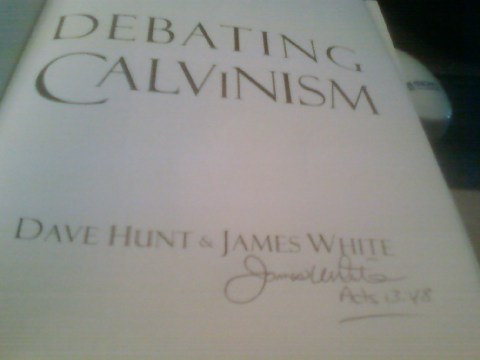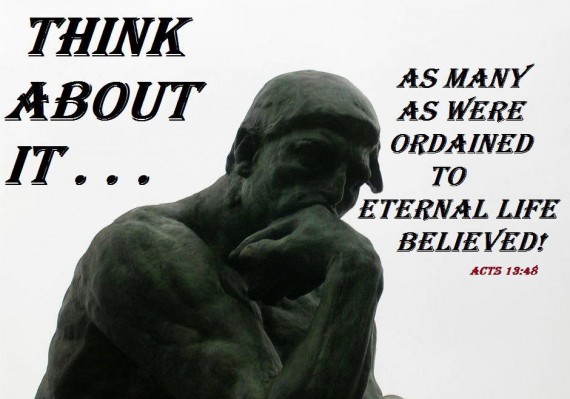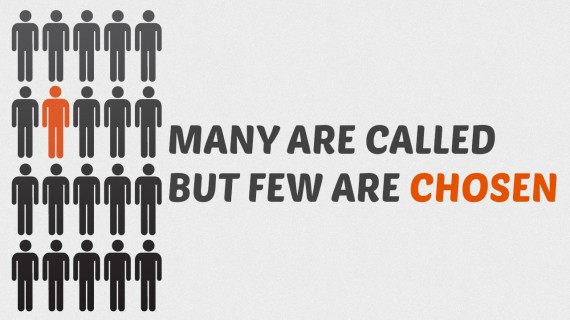One critical text for the Calvinistic understanding of Unconditional Election is Acts 13:48.
This text seems to indicate that God specially and sovereignly prepares the hearts and minds of some people to respond to the gospel. In the context, Paul has been proclaiming the gospel in Antioch, and when he concludes, Luke records this about those who heard Paul preach:
And when the Gentiles heard this, they were glad and glorified the word of the Lord. And as many as had been appointed to eternal life believed (Acts 13:48).
Acts 13:48 is Popular Among Calvinists
Due to the apparent clarity of this text, it is nearly impossible to find a Calvinistic defense of Unconditional Election which does not place heavy emphasis on Acts 13:48. One Calvinist even states that this is the verse that converted him to Calvinism in the first place (Nettleton, Chosen to Salvation, 16).

Other Calvinists are in agreement about the apparent power of this verse to prove Unconditional Election:
Here is another text with stunning clarity for whoever will read the Bible without preconceived notions about election (Palmer, Five Points of Calvinism, 29).
… Every article of human ingenuity has been employed to blunt the sharp edge of this scripture and to explain away the obvious meaning of these words, but it has been employed in vain, though nothing will ever be able to reconcile this and similar passages to the mind of the natural man (Pink, Sovereignty of God, 52).
In response to the first quote from Palmer, we would say that one reason the Calvinist so clearly see election in this text is precisely because they read the Bible with preconceived notions about election.
In fact, one reason that people see election in this text is because the translators of our English Bibles often use words that convey this idea, even though it is not present in the original Greek. So it could be said that if someone reads this text in the Greek without preconceived notions of election, they would not come away with the Calvinistic doctrine of Unconditional Election.
The Meaning of “Appointed” in Acts 13:48
There are numerous arguments from the Greek context of these words and the textual context of Acts which provide a different understanding of Acts 13:48 than what the Calvinists would have us believe.
Let us begin with a look at the Greek word for “appointed” or “ordained” (Gk. tetagmenoi, the perfect participle of tassō).
Warning: Since this text is so crucial, and since our understanding of the text depends so much on the Greek word in question, we will have to get somewhat technical in our explanation.

The passive participle for tassō in Acts 13:48 could either be in the middle or passive voice, as both are spelled the same way in Greek. Most Calvinists understand the word to be in the passive voice, and translate it as such so it appears that people who believe in Acts 13:48 are totally passive in their reception of eternal life: They were ordained by God to believe, and so they did believe. End of story.
But if we consider that the Greek participle is in the middle voice, a completely different understanding emerges. In this case, the terms would not be translated as “appointed” or “ordained” but as something closer to “marshalled themselves, prepared themselves, or disposed themselves” (Alford, The Greek New Testament, II:153; Shank, Elect in the Son, 87).
This understanding of the word not only makes more sense in the immediate context, but also fits with the broader context of Scripture.
In the immediate context, those who end up believing attended the synagogue on the Sabbath and heard the preaching of Paul, then joined with the Jews in inviting Paul to speak a second Sabbath, and after hearing him on this day, believed what they heard. The implication then in Acts 13:48 is that they had been thinking and mulling over what Paul had said for an entire week, and after hearing him a second time, became convinced of the truth of his words. Their belief was no passive working of God on their hearts and minds, but was their week-long consideration and response to what God was doing in their midst.
Not only does the middle voice translation of tetagmenoi in Acts 13:48 fit best with the immediate context, but this understanding fits with the broader context in several ways.
First is context of Acts 13 which contains numerous contrasts about how people respond to the gospel. “Acts 13 is a study in contrasts in how different people prepare themselves to hear the gospel” (Lazar, “Election for Baptists,” 6). In the beginning of the chapter, the contrast is between Bar-Jesus and Sergius Paulus. One man was open to the truth while the other was full of deceit (cf. Acts 13:7, 10).
Then when Luke writes about Paul preaching in Pisidian Antioch, he shows how the Gentiles accept what is preached while the Jews oppose it. This event in Acts 13 marks the beginning of the theme in Acts where the Gentiles often respond favorably to the gospel while the Jews do not (cf. Vance, Other Side of Calvinism, 346-348).
The reason for this transition, Luke indicates, is not because God has now “chosen” the Gentiles instead of His other “chosen” people, the Jews, but because the Gentiles were more open to hearing, considering, examining, and accepting the things Paul preached to them, while the Jews are more set in their traditional ways and beliefs, and so are less willing to consider that they might be wrong.
The Jewish rejection of Paul’s message was not foreordained or predetermined by God either, as indicated by the middle voice of the word “reject” (Gk., apōtheō) in Acts 13:46. The Jewish rejection in the middle voice indicates that the Gentile disposition to accept the gospel message should also be in the middle voice.
Robert Shank writes strongly about the way to properly translate and understand Acts 13:48:
The fact that human agency is explicitly asserted in verse 46—“since you thrust [the word of God] from you and judge yourselves unworthy of eternal life”—strongly militates against any assumption of divine agency in verse 48 and of an eternal decree of unconditional particular election (Shank, Elect in the Son, 184).
One reason the Jewish people did not accept the gospel message (from Jesus or Paul) is that it threatened their exalted position as God’s only “chosen” people.
If God was now accepting the Gentiles into His family, then the Jewish people could no longer think of themselves as God’s chosen people, for He had apparently chosen all people in Jesus Christ. Such an idea was a threat to their theology, their pride, and their power. The Jewish people were more than willing to accept that God loved Gentiles, as long as the Gentiles tried to become Jews.
But when Paul (as Jesus before him) announced that even the Gentiles were loved and accepted by God (cf. Acts 13:47), the Gentiles proselytes who were trying to become Jews realized that they did not have to become Jews in order to be accepted by God, and as a result, they rejoiced and believed.
On this point, I. Howard Marshall seems to say that the faith of the Gentiles in Acts 13:48 was preceded by their faith in God as Jewish proselyte. He writes that Acts 13:48 “could also refer to those who had already put their trust in God in accordance with the Old Testament revelation of his grace and were enrolled in his people” (Marshall, Acts, 231).
Therefore, the faith of the Gentiles in Acts 13:48 would be very similar to what we saw Jesus saying in John 6 and John 10 about why some Jewish people believed in Him when others did not. Just as some Jews had learned to hear God’s voice and follow Him, and so they recognized the voice of Jesus when He came, so also, some Gentiles had been seeking a place in God’s family by faith, and so naturally believed in Jesus when they heard that God had accepted them by His grace.
Furthermore, what Jesus taught about the Jews in Matthew 22:1-16 is echoed here. In that parable, the first group of people who were called to participate in the King’s wedding feast were judged to be unworthy (Matt 22:8). And why were they unworthy? Because they were unwilling to come (Matt 22:3). The same idea is found here in Acts 13. The Jewish people were unwilling to believe the message which Paul preached, and so they too were judged unworthy of it.
This leads us to consider one of the reasons Luke wrote Acts in the first place. According to his opening line, Luke is writing to a Gentile name Theophilus (Acts 1:1) who is interested in learning about Jesus and the founding of the church. Therefore, it is critical for Luke to impress upon his reader the importance of studying, researching, investigating, examining, and considering the historical accuracy and theological truths which Luke presents in his book.
It would not fit Luke’s purpose in writing this letter to tell Theophilus to teach Theolphilus that if he wanted to receive eternal life, all he had needed to do was wait for God to sovereignly give it to him. Instead, Luke’s message to Theophilus is consistent with what he illustrates throughout the book of Acts with examples like these Gentile believers here and the conversion of Cornelius in Acts 10.
And what truth is this? That people can prepare or position themselves to respond favorably to any future truth of God if they remain open and receptive to the truth God is revealing to them right now (Cf. Vance, Other Side of Calvinism, 347).

Finally, this understanding of tetagmenoi as “disposed” fits best with other uses of the same term in Acts as well. Aside from Acts 13:48, the word is also used in Acts 15:2, 22:10, and 28:23. In Acts 15:2 and 28:23, the word is clearly referring to the actions, attitudes, and decisions of people, rather than to some divinely-ordained predisposition to the Gospel which was unconditionally granted by God.
Outside of the book of Acts, Luke (who also wrote Acts) uses the word in Luke 7:8 to refer to human authority and control. Paul follows a similar track when, in 1 Corinthians 16:15, he uses this word in connection to Christians who have devoted themselves to a particular ministry.
On this final point, although G. Delling says that “According to Acts 13:48 the man who is a Christian is ordained to eternal life,” he explains what the verse menas by writing this:
Elsewhere God is the One who orders or appoints, though only in the passive in the NT and with no mention of God in Acts. God has arranged the commission which results [in Paul’s conversation experience] on the Damascus Road. … The idea that God’s will to save is accomplished in Christians with their conversion is obviously not connected with the thought of predestination, but rather with that of conferring status (Delling in Kittel, TDNT, 29).
In other words, though God may order the events which allows a person to hear the message of the Gospel, and while God gives eternal life and confers the status of sonship to those who do believe, God does not force anyone to believe or restrict others from doing so.
Though God organized and commissioned the events on the Damascus Road which led to Paul’s conversion, Paul was not forced to believe and could have chosen otherwise. So also with those who believe in Acts 13:48. Paul, as a servant of God, was sent by God to preach to the Gentiles in Antioch.
Many of those who heard him preach were God-fearing Gentile proselytes (cf. Acts 13:42-43), and so were predisposed to respond to the gospel when they heard it. It is these who believed the message Paul preached, and it is these who received eternal life.
Bible Scholars on “Appointed” in Acts 13:48
There are numerous Bible scholars and Greek experts who agree with this sort of explanation. Aside from the citations above, here are quotes from several more:
In the controversies on predestination and election this sentence has constantly been brought forward. But it is manifestly unfair to take a sentence out of its context, and interpret it as if it stood alone. In Acts 13:46 we are told that the Jews had judged themselves unworthy of eternal life, and all that is meant by the words in this verse is the opposite of that expression. The Jews were acting so as to proclaim themselves unworthy; the Gentiles were making manifest their desire to be deemed worthy (Lumby in “The Acts of the Apostles” in The Cambridge Bible, 168).
The din of many a theological battle has raged round these words, the writer of which would have probably needed a good deal of instruction before he could have been made to understand what the fight was about. … It would seem much more relevant and accordant with the context to understand the word rendered ‘ordained’ as meaning ‘adapted’ or ‘fitted,’ than to find in it a reference to divine foreordination. … The reference then would be to the ‘frame of mind of the heathen, and not to the decrees of God’ (Maclaren, Exposition of Holy Scripture, 11:48).
The Gentiles were hungry for the Word [whereas] the Jews were culpable for rejecting the gospel. Indeed they judged themselves unworthy of eternal life. … Those who hear the good news and reject it are condemned not because they were unable to believe, but because they rejected the saving message and hence in effect judged themselves unworthy of eternal life!
… The Greek verb used here is not the one which means to choose or to elect. If Luke were making a point about election, why didn’t he use that verb? Nowhere else in the entire Bible is this word used of election! In fact, not only does the word not refer to election, it is even possible, if not probable, that it doesn’t mean appointed here either.
… In v. 42 the Gentiles “begged [Paul and Barnabas] that these words might be preached to them the next Sabbath.” Begging suggests devotion. They were devoted to learning about the good news of eternal life. This makes good sense in the context and it also makes a nice parallel. The Jews in Pisidian Antioch rejected the teachings of Paul and Barnabas and judged themselves unworthy of eternal life. The Gentiles, oppositely, accepted the teachings of the apostles. However, instead of saying “they judged themselves worthy of eternal life,” Luke chose to say instead that the Gentiles believed, as many as had been devoted to eternal life. (Note: the Greek puts “they believed” before the words “as many as…”) They first devoted themselves to searching out the way to eternal life and then having discovered the message (Jesus guarantees eternal life to all who simply believe in Him) they believed it (Wilkin, “As Many as were Devoted to Eternal Life Believed”).
Chrystostom goes so far as to say that the expression tetagmenoi is employed to intimate that the thing is not a matter of necessity, or what is compulsory. And thus, far from favoring the system of an absolute decree, the words would lead to the opposite conclusion, that the Creator, while ‘binding nature fast in fate, left free the human will’ (Bloomfield, The Green Testament, ad loc.).
The best rendering [of Acts 13:48] then would be, “were (found) disposed to eternal life,” which preservers the exact shade of the verb (‘to set in order, arrange, dispose’ [cf. Thayer]) and has just that degree of ambiguity which belongs to the original (Bartlet, The New Century Bible: The Acts, ad loc.).
Acts 13:48 Does Not Teach Unconditional Election
So by the weight of contextual evidence, it seems clear that Acts 13:48 does not teach Unconditional Election.
Even if, however, all the contextual and exegetical material presented above is wrong, and this verse does in fact teach that God ordained these particular Gentiles to receive eternal life (which the arguments above show He did not), this verse is still not a good proof-text for the Calvinistic doctrine of Unconditional Election. Laurence Vance explains why:
There are also a number of things that Acts 13:48 does not say. It doesn’t say one has to be ordained to believe. It doesn’t say there are “reprobates” who can’t be saved. It doesn’t say that anyone was ordained unconditionally. It does say that anyone was ordained before the foundation of the world. It doesn’t say that one was ordained by a sovereign decree. It doesn’t say that those who are ordained will believe. It doesn’t say that everyone who was ever saved was ordained to believe (Vance, Other Side of Calvinism, 347).
In the end, we must say that not even Acts 13:48 teaches Unconditional Election, even though it is said to be one of the clearest statements in the Bible on the topic.
If you want to read more about Calvinism, check out other posts in this blog series: Words of Calvinism and the Word of God.






 I listened to a sermon today in which the preacher (I’m not going to call him a pastor) said these things:
I listened to a sermon today in which the preacher (I’m not going to call him a pastor) said these things:






 But if the equal treatment of all by God is the point of this parable, why doesn’t Jesus say something to that effect in Mathew 20:16?
But if the equal treatment of all by God is the point of this parable, why doesn’t Jesus say something to that effect in Mathew 20:16? 
